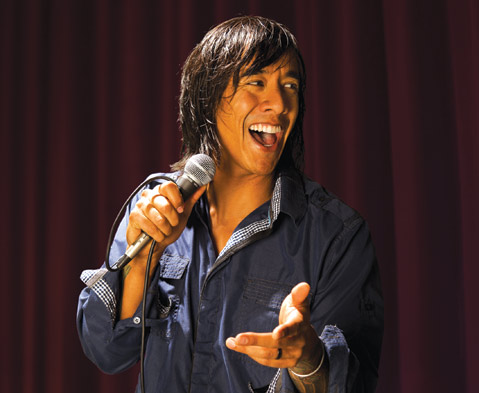Up Close with Kip Fulbeck
UCSB Professor Brings Slam Poetry to the Classroom

Kip Fulbeck is one of those people whose simple presence leaves you noticeably affected. Add in a few colorful stories about his students, and you’ll walk away inspired.
Fulbeck’s name precedes him as one of the standout faces on UCSB’s campus. The artist famous for his multiracial-identity work supplies the UCSB art program with a number of self-expressive classes. Specifically, it’s his spoken-word course (the first of its kind to be offered in any university in the United States) that challenges students with intense self-expression, as well as lessons on how to engage audiences.
Fulbeck started the class in the late 1990s. Nowadays, the course is one of the more popular on campus, and the end-of-the-quater performances his students put on routinely attract overflowing audiences. I recently sat down with Fulbeck and his dog in his UCSB art studio to discuss the class and the experience it provides for students.
How is learning spoken word applicable to everyday life? Everything you’re doing, whether it’s trying to get a job, proposing to someone, meeting someone at a bar, you interviewing me right now — these are all forms of spoken word.
You have experience with slam poetry. Why did you steer away from slam poetry for this class? I don’t like the idea of competition and art being put together. I think it often distills the quality of work down to a caricature of itself. Seeing poetry slams often reminds me of watching American Idol. You’ve got a series of judges, an audience that comes in looking for a certain shtick that they want to see and that’s what they’re going to cheer for.
How is spoken word challenging? Often, they come in wanting to do the fun thing. But it’s not that easy. You can’t just say, ‘I want to go to the Olympics; looks fun.’ You’ve got to put your time in. I care about people that are committed. I’m not an easy teacher. The way I look at it is, you come to class every day and you do average work, you’re going to get a C. If you do really superlative work, you might get a B. And if you stop God, you’ll get an A. I would love if the class was all As, but it never happens. It’s not an easy thing. We don’t pay attention to our bodies. Athletes know how to train their bodies to peak. The same thing happens when you’re training to perform. The analogy I use is that, if this was a painting class, you would never come to class with a bunch of dirty, cracked up brushes and start painting. You begin with the cleanest, purest elements you can utilize.
How do keep the classes small? That first day they drop like flies. I think my record was 30 kids [who dropped the class] the first day, and 17 the second day. I had to pride myself on that, because those 17 students had the best class they’ve ever had. There are other courses where you can just be there halfway, but this isn’t one of them because you get up in front of 200 people and you are going to be alone and naked up there. It’s your story, your topic, and you have to sell it. I’ve bombed in front of hundreds of people, and I’ve had 1500 people standing up cheering. You want to grab that and get there.
What are common topics for your students’ spoken word projects? They do a lot of boy-girl, girl-boy stuff, a lot of self-effacing. What gets in the shows are usually the funnier things because that’s what works in shows, but that’s not all of what we do in class. Not everyone in the class gets to do the show [at the end of the quarter].
Do students disclose a lot about themselves in their projects? They usually tend to open up. Sometimes they just do funny daily observations — writing about college life is always funny. To do a piece about what it’s like on the bike path is guaranteed funny. Talking about an IV party, trying to meet someone at the smoothie shop — people love that stuff, because everyone’s been there.
Why is learning spoken word worthwhile? You don’t get to do this when you are 35 and work for Bank of America. [The students] cherish it, and they should.
Look out for Fulbeck’s class’s performances near the end of UCSB’s academic quarters. For more information on Fulbeck, visit seaweedproductions.com.



